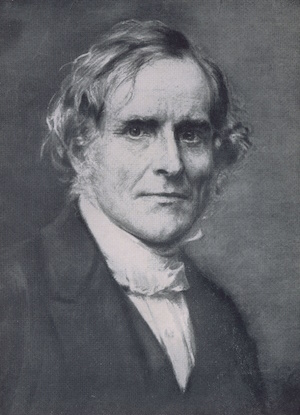
Priest, Theologian
F. D. Maurice was an Anglican Clergymen, a polific auther and a professed Christian Socialist who differed profoundly from his opponents on either flank. Criticized by the Church for being a socialist, but the socialists didn't accept him because of his insistence on a religious base to social action. He called for radical, non-violent reform through the renewal of faith, and saw worship and prayer as the source of energy for the church’s mission.
- The son of a Unitarian minister. His early life was marked by angry family debates on religion, at 18 he left home.
- 1823: He entered Trinity College, Cambridge, to study law, but as a non-Anglican he was debarred from formal graduation and from taking up a college fellowship. He moved to London and in 1830, concluded that only a national church could provide the best spiritual renewal in society. He was then baptised and entered Exeter College, Oxford.
- 1834-1836: He was Ordained, his first clerical assignment, was an assistant curacy in Bubbenhall, Warwickshire. During this time he wrote a novel “Eustace Conway”, (1834) and was praised by Samuel Taylor Coleridge.
- 1836-1860: He was appointed chaplain of Guy's Hospital, took up residence and "lectured the students on moral philosophy". He also served as editor of the Educational Magazine during its existence. He also wrote his most signifigant work, The Kingdom of Christ'(1838) His main theme from then on was moral and metaphysical philosophy. A strong supporter of catholicity as exemplified in the Church of England, he found many theological opponants of his views.
- 1840: Maurice was elected professor of English literature and history at King's College, London.
- 1846: The college added a theological department, and he became a professor there. The same year being elected chaplain of Lincoln's Inn, so he resigned the chaplaincy at Guy's Hospital.
- 1845-1853: Maurice was Boyle lecturer (nominated by the Archbishop of York), and the Warburton lecturer (nominated by Archbishop of Canterbury).
- 1848: He founded Queens College for women.
- 1854: He founded the Working Men's College.
- 1860: He was appointed to St Peter’s Chapel, Vere Street.
- 1866: He became professor of moral theology at Cambridge and incumbent of St Edward’s, Cambridge.
- 1871-1872: His last authered work was published, Moral and Metaphysical Philosophy, 2 vols in 1871–1872'.
By his ideals of Christian Socialism he sought to arouse the conscience of church people and to gain their support and help for the material and spiritual welfare of working people. He became highly respected for the nobility of his character and his dedicated service to others.
BORN: 29 August 1805, Lowestoft, Suffolk, England
DIED: 1 April 1872, London, England, U.K.
 Welcome
Welcome Calendar
Calendar Today's Word
Today's Word Lauds
Lauds Terce
Terce Sext
Sext None
None Vespers
Vespers Compline
Compline Matins
Matins